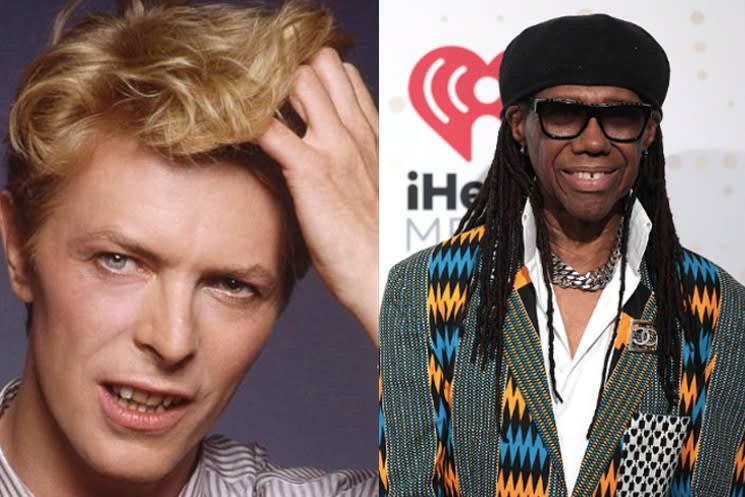It's rather unanimously agreed upon that the late David Bowie was pretty good at music — one of the all-time greats, so to speak. But Chic's Nile Rodgers, who helped him break into the mainstream by co-producing 1983's "Let's Dance," isn't sure the iconic musician would even be given the time of day in today's music industry.
Speaking in front of a House of Commons committee investigating the streaming economy and artist remuneration, Rodgers lamented how modern-day labels focus more on profit than nurturing the talents of truly unique artists like Bowie.
He went so far as to say that, given Bowie's run of '70s albums that failed to succeed commercially beyond the UK, no streaming-era label would have given him the time that he needed to produce a hit record.
"They gave him all that time to try and make a hit, he called me up and we made ['Let's Dance']," said Rodgers [via The Guardian]. "[The labels] took on this financial responsibility and they would carry the artists they believed in that at some point in time would finally break, those days are truly over."
UK MPs called for a "complete reset" of music streaming in 2021 with a landmark series of recommendations to make the current industry standard more fair for artists. Rodgers was part of the panel — which also featured academics David Hesmondhalgh and Hyojung Sun, who produced a report on the economics of streaming, and Merck Mercuriadis, who founded music management company Hipgnosis alongside Rodgers — that remarked on the slow, limited progress that had been made toward their goals.
In their report, the committee estimated that streaming services take 30 to 34 percent of revenue, with labels recouping 55 percent and the rest being shared amongst the recording artists, publishers and songwriters. Comparatively, Rodgers shared that he received $100,000 after his first Chic album sold a million copies in 1977, while Snoop Dogg recently claimed to have been paid $45,000 for a billion streams.
Responding to Snoop's claims, Spotify argued that it makes money primarily from two sources: Spotify Premium subscriptions and ad sales on the streaming service's free tier. "Nearly 70 percent of this money is paid out to music rights-holders to what we call the 'royalty pool,'" a spokesperson alleged.
Meanwhile, labels are claiming that their majority share in streaming revenue is just because of the substantial risks of their A&R investments, which see them shelling out money on acts that might not become commercially successful.
"I really hate the fact that they keep using that argument that is completely archaic," Rodgers commented. "I hate to use words like 'lie' — but it's a lie," because, as Mercuriadis added, streaming data enables labels to not gamble on an artist that isn't already putting up numbers.
Speaking in front of a House of Commons committee investigating the streaming economy and artist remuneration, Rodgers lamented how modern-day labels focus more on profit than nurturing the talents of truly unique artists like Bowie.
He went so far as to say that, given Bowie's run of '70s albums that failed to succeed commercially beyond the UK, no streaming-era label would have given him the time that he needed to produce a hit record.
"They gave him all that time to try and make a hit, he called me up and we made ['Let's Dance']," said Rodgers [via The Guardian]. "[The labels] took on this financial responsibility and they would carry the artists they believed in that at some point in time would finally break, those days are truly over."
UK MPs called for a "complete reset" of music streaming in 2021 with a landmark series of recommendations to make the current industry standard more fair for artists. Rodgers was part of the panel — which also featured academics David Hesmondhalgh and Hyojung Sun, who produced a report on the economics of streaming, and Merck Mercuriadis, who founded music management company Hipgnosis alongside Rodgers — that remarked on the slow, limited progress that had been made toward their goals.
In their report, the committee estimated that streaming services take 30 to 34 percent of revenue, with labels recouping 55 percent and the rest being shared amongst the recording artists, publishers and songwriters. Comparatively, Rodgers shared that he received $100,000 after his first Chic album sold a million copies in 1977, while Snoop Dogg recently claimed to have been paid $45,000 for a billion streams.
Responding to Snoop's claims, Spotify argued that it makes money primarily from two sources: Spotify Premium subscriptions and ad sales on the streaming service's free tier. "Nearly 70 percent of this money is paid out to music rights-holders to what we call the 'royalty pool,'" a spokesperson alleged.
Meanwhile, labels are claiming that their majority share in streaming revenue is just because of the substantial risks of their A&R investments, which see them shelling out money on acts that might not become commercially successful.
"I really hate the fact that they keep using that argument that is completely archaic," Rodgers commented. "I hate to use words like 'lie' — but it's a lie," because, as Mercuriadis added, streaming data enables labels to not gamble on an artist that isn't already putting up numbers.




